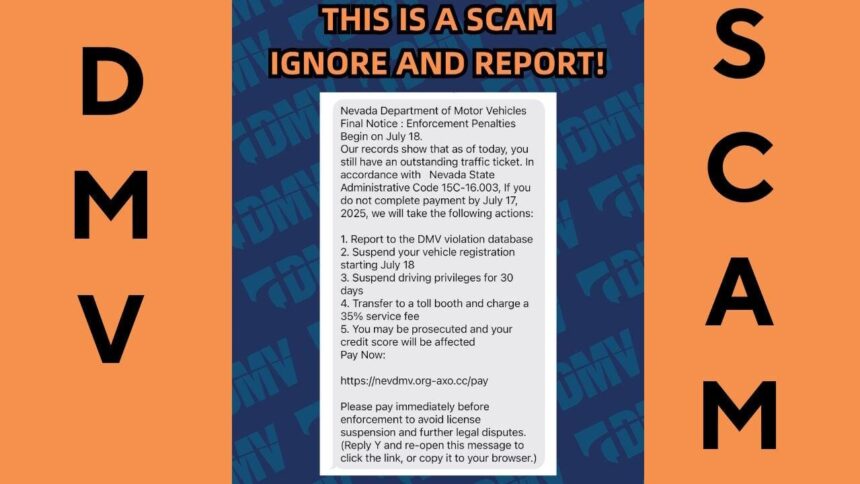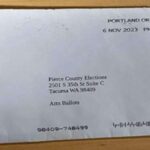Beware of the Latest Nevada DMV Traffic Ticket Text Message Scam
Nevada drivers are being cautioned about a surge in deceptive text message scams falsely claiming to be “final notices” for unpaid traffic tickets. These fraudulent texts are crafted to lure recipients into clicking harmful links that can compromise personal data or lead to financial theft. The Nevada Department of Motor Vehicles (DMV) emphasizes the importance of verifying any ticket-related notifications exclusively through official DMV platforms to safeguard against these scams.
Understanding the New Traffic Ticket Phishing Scam Targeting Nevada Drivers
Recent reports have highlighted a phishing campaign targeting Nevada motorists with bogus text messages warning of outstanding traffic fines. These messages often claim to be “final notices” and include links to counterfeit payment websites designed to steal sensitive details such as credit card numbers and personal identifiers.
To protect yourself, the Nevada DMV recommends the following safety measures:
- Avoid clicking on links in unexpected texts about traffic violations.
- Confirm any alleged tickets by visiting the official DMV website or calling their verified customer service numbers.
- Be skeptical of messages that use urgent or threatening language demanding immediate payment.
- Look out for spelling errors, inconsistent logos, or unusual sender information.
| Common Scam Indicators | Recommended DMV Verification Practices |
|---|---|
| Unexpected “Final Notice” texts | Check ticket status through the official DMV portal |
| Links leading to unofficial websites | Use DMV’s verified contact information for inquiries |
| Pressure to pay promptly | Cross-reference with prior mailed notices |
How This Scam Works and What Happens to Victims
Scammers impersonate the Nevada DMV by sending urgent texts that allege unpaid traffic tickets requiring prompt payment. These messages often brand themselves as “final notices” and include links to fraudulent websites that harvest personal and financial data. Sometimes, the scammers use real or fabricated ticket numbers to appear legitimate. However, the DMV never sends payment links via text messages.
Individuals who fall prey to these scams may face:
- Unauthorized charges on their bank or credit cards
- Identity theft from stolen personal information
- Follow-up scam attempts through calls or emails
- Long-term credit score damage due to misuse of data
| Warning Signs | Explanation |
|---|---|
| Demand for immediate payment | Creates pressure to pay quickly to avoid penalties |
| Texts from unknown numbers | No prior official DMV interaction |
| Suspicious website URLs | Sites that do not match official DMV domains |
| Missing personal details | Messages lack your full name or ticket specifics |
Verifying Authentic DMV Communications: Essential Steps
Before responding to any message claiming to be from the Nevada DMV, residents should refrain from clicking on links or calling numbers included in suspicious texts or emails. Instead, verify the information by visiting the official Nevada DMV website or contacting their customer service through authorized phone numbers. Genuine DMV notifications typically include specific ticket or case numbers, so having your personal and vehicle details ready can definitely help confirm legitimacy.
Be alert for red flags such as poor grammar, urgent payment demands, or requests for unconventional payment methods like gift cards or cryptocurrencies. Here are speedy tips to stay safe:
- Verify the sender’s email domain or phone number to ensure it matches official DMV contacts.
- Use official state websites or DMV-approved apps to check your ticket status.
- Never disclose personal or financial information in response to unsolicited messages.
- Report suspicious communications to the DMV’s fraud hotline immediately.
| Suspicious Element | Verification Action |
|---|---|
| Unknown sender number | Check official DMV contact info on nv.gov |
| Urgent payment request | Contact DMV directly before making any payment |
| Requests for gift card payments | Report immediately to DMV fraud department |
How to Protect Yourself and Report Suspected Scams
When you receive unexpected texts about supposed traffic tickets, stay cautious and avoid clicking any embedded links. Scammers often use alarming phrases like “final notice” to rush victims into action,potentially leading to phishing sites or malware infections. Always confirm the authenticity of such messages by contacting the Nevada DMV directly through official channels rather than responding to unknown numbers.
If you suspect a scam, take these protective steps to safeguard your information and assist authorities in combating fraud:
- Do not reply or engage with suspicious texts.
- Report the scam to the Nevada DMV’s dedicated fraud hotline or official website.
- Forward the suspicious message to the national spam reporting number, 7726 (SPAM).
- Regularly monitor your bank and credit card statements for unauthorized activity.
| Contact Resource | Purpose | How to Reach |
|---|---|---|
| Nevada DMV Fraud Hotline | Report suspected ticket scams | Phone call or online submission |
| Spam Reporting (7726) | Report unsolicited or scam texts | Forward scam texts to 7726 |
| Local Police Departments | File official fraud complaints | In-person or online reporting |
Final Thoughts: Stay Alert to Avoid Traffic Ticket Scams
The Nevada DMV strongly advises all drivers to remain cautious and avoid responding to unsolicited text messages claiming to be final notices for unpaid traffic tickets. These scams are designed to steal personal information or money, and the DMV confirms it does not send payment links via text.Always verify any ticket-related information through official Nevada DMV channels to protect yourself from fraud. Staying informed and vigilant is the most effective way to defend against these deceptive tactics.










